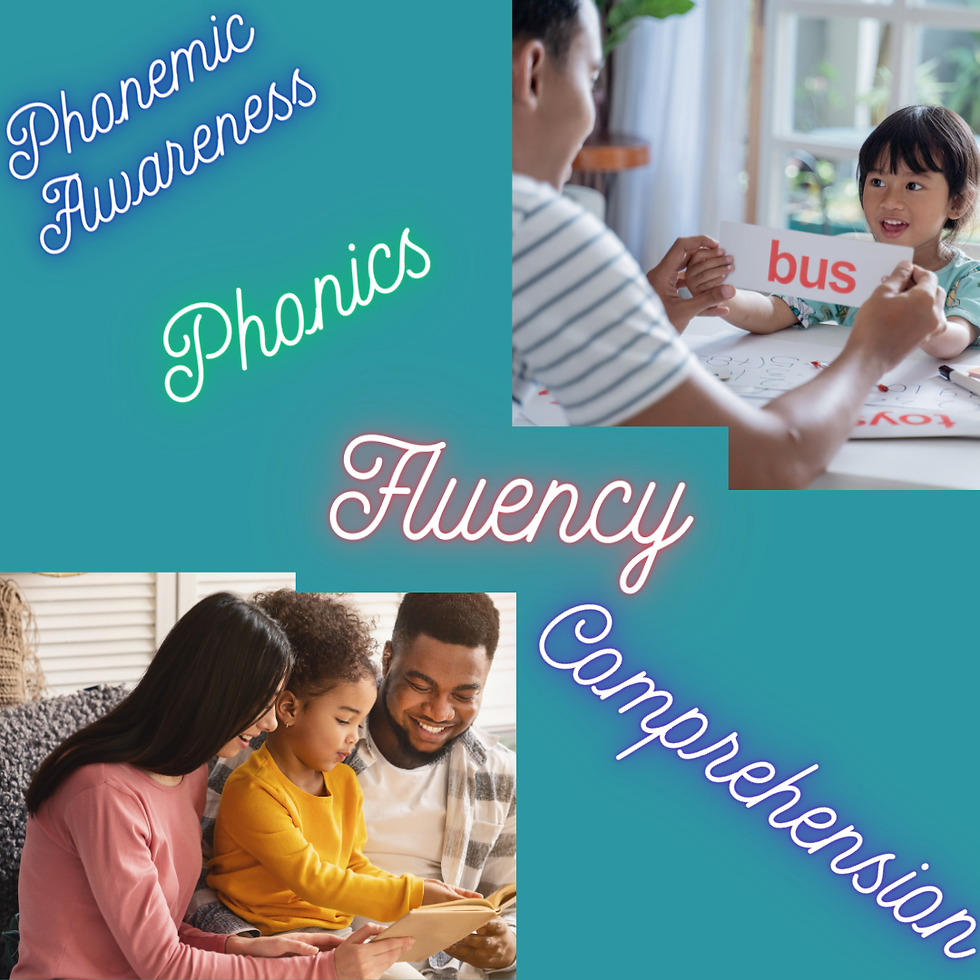Unlock Your Child's Reading Potential: The Science of Reading For Parents
- Kelly Sutherland
- Jul 8, 2024
- 3 min read
Updated: Jul 9, 2024

Understanding the science of reading is crucial for empowering your child to become a skilled and confident reader. This comprehensive blog post delves into the essence of the science of reading, its historical evolution, and the fundamental components that contribute to effective reading education. By the end of this article, you will gain insightful knowledge into how evidence-based strategies can enhance your child's reading abilities and academic success.
What is the Science of Reading?
The science of reading is a term encompassing the vast body of research conducted over the past 50 years on how reading is acquired and taught. This research-driven approach primarily focuses on the practical application of academic findings within classroom instruction.
Why Understanding Reading History Matter?
The prominence of the science of reading surged in the 1990s. In 1997, the establishment of the National Reading Panel marked a pivotal moment, as it evaluated existing research to identify best practices for teaching reading. The panel's findings aimed to uncover the most effective methods for helping children learn to read.

Five Components Every Parent Should Know
The National Reading Panel's research culminated in identifying five critical components of reading education: phonemic awareness, phonics, fluency, vocabulary, and comprehension. These components have become foundational in many educational programs and are even mandated by law in some states.
Understanding the Interrelation of Reading Components
Despite listing these components individually, experts like Dr. Hugh Catts from Florida State University highlight their interrelated nature. This interconnectedness can complicate the teaching process, as each component influences the others. For instance, comprehension doesn't merely build upon understanding the alphabet but also integrates factors like fluency and vocabulary.

Alphabetic Principle and Fluency: Key Skills for Early Readers
Looking into the alphabetic principle, it splits into phonemic awareness and phonics, both crucial for early reading skills. Phonemic awareness involves recognizing and manipulating sounds in language, a skill that leads to decoding words. Phonics, on the other hand, teaches the relationship between these sounds and their corresponding letters.
Fluency, often misunderstood as merely reading speed, encompasses accurate reading, appropriate pacing, and expression (prosody). Together, these elements aid in better comprehension, enabling readers to understand and enjoy texts thoroughly.
Comprehension: The Heart of Reading Success
Comprehension, one of the most complex reading components, requires understanding text beyond just decoding words. Effective comprehension entails grasping the main ideas and the ability to garner knowledge or enjoy literature from what is being read.

Overcoming Traditional Reading Challenges
For nearly three decades, many schools favored a whole language approach, which emphasized contextual learning and cueing systems over systematic phonics instruction. This approach often left students with gaps in sequential knowledge, making it difficult for them to retain and apply their learning across different contexts.
The Superior Benefits of a Phonics-Based Curriculum
Research has consistently shown that a strong foundation in high-quality, phonics-based curriculum benefits all students, particularly those with dyslexia or other reading difficulties. Such an approach does not overburden students' working memory, making the learning process more effective and efficient.
Empower Your Child's Reading Journey
In conclusion, the science of reading represents an evidence-based, research-backed body of knowledge that guides how we teach reading. Applying these principles in classroom instruction yields significant benefits for all students, especially those struggling with traditional methods.
Understanding and implementing the science of reading can transform reading instruction, fostering a generation of proficient and confident readers.
RELATED RESOURCES
Click here for more information about this topic.
Looking to help your child build even stronger reading skills ? Download our free guide, "7 Strategies for Building Strong Readers," and unlock effective methods today!
Take your child's reading skills to the next level with our comprehensive course, "Unlock Your Child's Reading Potential: Science of Reading Explained with Effective Strategies for Parents," and start making a difference!
Currently on sale for just $27.











Comments